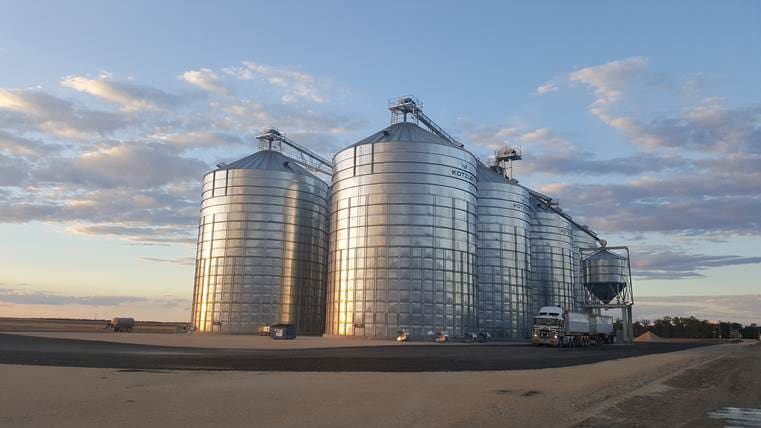
Grain storage is a feature of One Tree. Photo: LAWD
PROTERRA Investment Partners has listed three aggregations covering a combined 42,467 hectares and expected to fetch more than $400 million.
The largest is the 23,594ha One Tree, a dryland and irrigated cropping aggregation which straddles the Queensland-New South Wales border.
Also on offer is the 14,425ha Racecourse portfolio which is centred on sugarcane production in the Mackay region, and Vaucluse, a 4448ha dryland and irrigated cropping and horticulture aggregation in Tasmania’s midlands.
All are for sale by expressions of interest (EOI) through LAWD.
LAWD senior director Danny Thomas said he expected the diversity of the three offerings to draw both local and international interest at a time of unprecedented demand for farmland.
“Proterra has done an outstanding job to strategically aggregate land and water assets and to transition these into highly productive aggregations, now representing more than $400 million in value, across wide-ranging geographical areas and commodities,” Mr Thomas said.
“Given these factors, we expect the different portfolios to appeal to diverse categories of investors and are foreseeing a very high level of enquiry given the global demand for assets of this quality in this class.”
Proterra managing director Becs Willson said the successful sale of the Corinella Farms cropping portfolio in Victoria and South Australia in 2021, which secured $360M for investors, had led to the decision to bring forward Proterra’s 10-year exit strategy from Australian farm assets.

Proterra managing director Becs Willson.
“It is a great time to capitalise on the existing strong market while there is insatiable appetite from investors who want to enter or expand in the agriculture space,” Ms Willson said.
“We have spent the last eight years building these highly productive agricultural operations and, ideally, they are not assets you would want to sell.
“However, the short-term nature of our investment fund, combined with high commodity prices and the calibre of the assets, presents us with an opportunity to continue our track record of strong returns to our investors.”
While the sale of these portfolios will conclude Proterra’s existing ownership of agricultural assets in Australia, the company will continue to look for agricultural land it can transform.
“We believe we have a unique approach in this asset class in terms of our operating models, including equity partnerships with local growers to help build and grow these businesses from the ground up,” Ms Willson said.
“We also now have a track record in executing profitable exit strategies with our investors at the forefront of our timing and are hoping to replicate this unique model across the Australian agriculture industry.”
With offices in Minneapolis, London, Sao Paulo, Singapore, Shanghai, and Sydney, Proterra launched as a standalone investment advisor and private equity fund manager from the Black River Asset Management private equity funds in January 2016.
The funds spun out from Black River Asset Management, a wholly-owned, independently managed subsidiary of Cargill Inc.
Although no longer an owner, Cargill maintains its relationship with Proterra as a partner to the funds.
Potential to split One Tree
One Tree comprises 21 holdings centred in the Goondiwindi and Jandowae districts in Queensland, and North Star, in northern NSW.
One Tree features self-mulching black brigalow soils which produce wheat, barley, chickpeas, faba beans over winter, and cotton and sorghum as summer crops.
Mr Thomas said One Tree would appeal to a range of buyers, including local farming families looking to expand their operations.
“The scale and geographic spread offered by One Tree is very special, with a lot of time and effort having been spent strategically aggregating land and water to create this A-grade institutional portfolio.
“While One Tree has been developed with an institutional buyer in mind, we are expecting strong bids from farming families, and can accommodate multiple transactions in this deal, as we did with Corinella Farms, if required.”
Ms Willson said future owners would benefit from Proterra’s corporate investment in maximising arable land.
“We have invested in extensive development to transition land from grazing to prime broadacre cropping, and combined properties to grow efficiencies for corporate agriculture,” she said.
Under Proterra’s ownership, more than 48,000t of combined grain storage has been added across the One Tree portfolio.
EOI on One Tree close May 5.
Vaucluse
Vaucluse features centre pivot and linear irrigation which waters 2151ha, plus hard-hose travelling irrigators that water a further 447ha.
The balance is dryland cropping and grazing land, and Ms Willson said Vaucluse was now one of Tasmania’s largest grain producers.
“Operating a five-year crop rotation across the farm, we have established Vaucluse as a high-calibre, large-scale cereal producer to benefit from strong demand from the Tasmanian livestock and aquaculture industries in an operating environment where there is limited local production.”
“By investing heavily in water infrastructure and agronomics, we have significantly improved yields, while the construction of a 5424t grain-storage facility has further allowed us to extract a premium price by holding grain on behalf of customers and delivering throughout the year to guarantee a consistent high-quality product.”
Other rotation crops include potatoes, poppies, carrots, and hemp.
“While these are only auxiliary to the cereal operations, the diversification means in any given season there will be at least one commodity in exceptionally high demand, making the asset an excellent hedge.”
Adding to its value, the property is home to historical buildings, offices, and modern agricultural infrastructure, including 10-bedroom Vaucluse Homestead, and a circa 1832 five-bedroom Glen Esk Homestead.
Vaucluse’s water entitlements total 15,273 megalitres, and storage capacity is 9000ML.
EOI on Vaucluse close April 28.
Source: LAWD, Proterra

Did the Racecourse portfolio sell?
We believe it did not, and Proterra has taken it off the market.